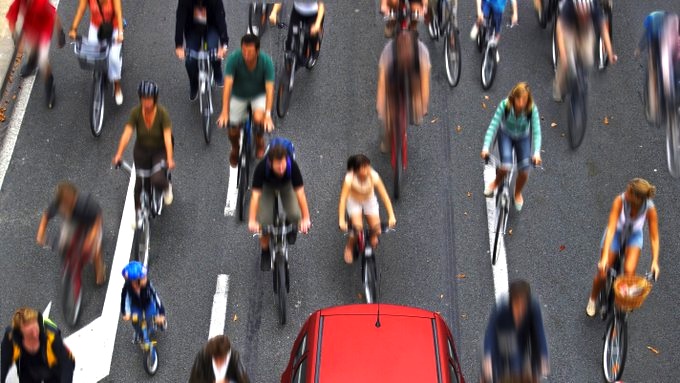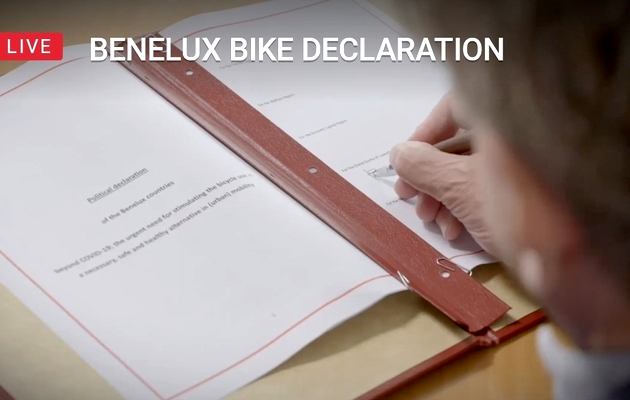July 15, 2020 - (Brussels, BEL) In a joint political declaration, the mobility ministers of the Benelux countries are calling on the European Commission to prioritise cycling in European climate policy and Sustainable Transport strategies. They call on the Commission to co-finance the construction of cycling infrastructure and to provide funds to stimulate cycling policy as part of the European Green Deal.

The Covid-19 crisis has had a massive impact on the state of mobility in Europe. During the lockdown period, cycle use increased in almost every European country. The (increased) use of this sustainable form of transport is not just essential if the EU is to achieve its climate objectives by 2050, but also has a positive impact on public health and the economy in the EU. Cycling in Europe brings €150 billion in benefits, of which €90 billion are linked to the environment, health and the mobility system. The cycle industry already provides hundreds of thousands of jobs and annual revenue from cycle tourism in the EU is estimated at €44 billion.
In their statement the ministers stress that the provision of safe, high quality cycling infrastructure and secureycle parking is essential to further stimulate cycle use. Further European research is also needed to map out the potential for cycling post Covid-19.

With this declaration, the mobility ministers of the Benelux are also calling on other EU Member States to provide the European Commission with up-to-date data on active mobility, which is not currently collected at EU level. They also call on them to make adequate funding available for cycling projects in their COVID-19 recovery plans and to take cycling into account in tourism and road policy. They ask regional and local authorities to expand networks of cyclepaths, to promote cycling campaigns and to arrange cycle sharing schemes during the summer months.
Lastly, it is the ministers’ intention to develop a cross-border plan (roadmap) later this year to stimulate cycling in their region.
The Dutch Secretary of state for infrastructure and water management, Stientje van Veldhoven: “In the Netherlands, cycling is as normal as water from the tap. The bike is our secret weapon against overcrowding. We have more bikes than residents. With the coronavirus crisis, more and more people across Europe are seeing the benefits of cycling. Cycling is cheap, healthy and good for the climate and clean air. That means that it’s worth paying more attention to good cycle paths, charging points for electric bicycles and good parking facilities in Benelux and all over Europe.”
The Belgian minister for mobility, François Bellot : “The Covid crisis has brought with it new behaviour, especially as regards mobility. Many people used bicycles. However, it seems that it is still seen as a form of recreation and not as a way of traveling for utility. Consideration should therefore be given to new initiatives at all levels – European, federal or regional – in order to encourage as many citizens as possible to use bicycles in their daily lives, for journeys to work or travel more generally. It is an environmentally friendly, economical and quiet mode of transport that contributes to reducing congestion, and I think it will have a real role to play in the mobility of tomorrow. That is why I really believe that this declaration makes sense, particularly in the current situation, and I hope that the European authorities, the other Member States and regional and local authorities will follow the recommendations made in the declaration.
Flemish minister for mobility and public works, Lydia Peeters: “Since the arrival of the coronavirus, more people have been cycling and walking. We need to maintain and promote this positive trend for sustainable travel. In this context, we have launched a ‘sustainable mobility toolbox’ for local authorities with practical actions that can be implemented, temporarily if needed. Thinking about streets reserved for cycles, the widening of cycle paths, footpaths and pedestrian crossings or installing additional bicycle parking. Together with local authorities, we are working on sustainable mobility measures to encourage people to cycle to school or work. In addition, we are running our ‘everybody keep cycling’ campaign, which should be a further incentive for choosing the bike for daily journeys. Also shared mobility has a place in all of this. We want to get everyone excited to try out shared mobility via test rides on the Blue Bike scheme. Not only now, but also in the years to come we will continue to invest in sustainable mobility in order to achieve a modal shift. For this year we are planning €180 million investments in cycling, to rise to €300 million by the end of the legislature”
The Walloon minister for mobility, Philippe Henry: “The Covid crisis was a major revelation which made it clear that the bicycle is a solution to a major challenge for the economy, health and mobility. Daily cycle use does actually solve many problems and results in significant economies of scale. During the lockdown, here in Wallonia, we took advantage of the situation to speed up and encourage municipalities to take truly ambitious measures to encourage cycling and I am very happy to tell you that it works. Today many areas have made cycling a priority: it is together that we will succeed”.
The Brussels minister for mobility, Elke Van den Brandt: “The best way of promoting cycling is a safe bike path. In Brussels we are working on an additional 40 kilometres of cycle path, to stimulate a shift to cycling. We are also working with Flanders and Wallonia to optimise cycle routes that connect the regions. In this way the bicycle can really become an alternative to car traffic”
The Luxembourg minister for mobility, François Bausch: “This year, for the first time, Luxembourg will launch a “Cycling Summer”; a selection of national roads will become cycle-only in August, in order to fill in the missing links in the national cycle path network. We have also doubled the government subsidy for the purchase of bicycles and electric bicycles. We now truly need to promote soft mobility as one of the key solutions for better mobility in the post-Covid-19 period.
















